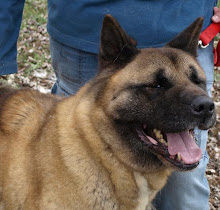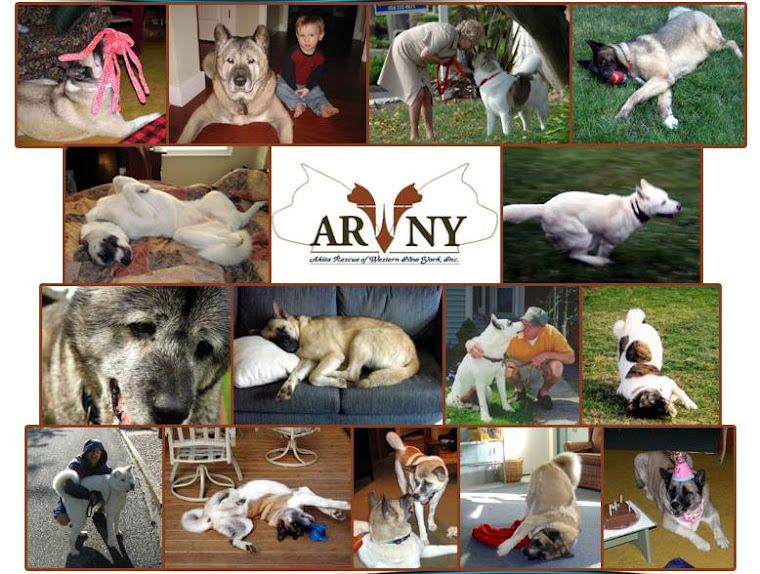As part of the Akita Club of America, I am happy to report that we have decided on a Code of Ethics for all Akita Rescues to follow.
However, on the down side, I'm sad we even needed to set up a Code of Ethics. You'd think anyone wanting to do rescue would do it right -- would do it for the good of the Akitas and not for any personal agenda. After all the very word rescue means: to free or deliver from confinement, violence, danger, or evil. But if I've learned one thing over the years, its that some people in rescue can be just as rotten, just as selfish, just as evil, as people in puppymills, petstores, or bad breeders can be also.
Way back when I started in rescue, I was so idealistic. After all, I was helping in rescue, and rescue was about saving Akitas' lives so everyone in rescue with me must be in this for the same reasons I was, right? I couldn't sleep at nite thinking about the Akitas in my care -- I worried constantly about finding the right homes, about making sure I wasn't allowing an Akita to die in a shelter, about how to find a way to get more qualified adopters, about how to find more good volunteers to help us spread the word. I went bankrupt over rescue at one point, I lost a marriage to rescue at another point, and ultimately I lost much of my health to rescue -- but it didn't matter, because I was saving Akitas' lives and MY GOD that was what kept me going. I was sure everyone in rescue felt the same way, right? I was sure if someone called themselves a 'rescue' it meant they had the good of their breed at heart.
So imagine my heartbreak the first time someone I thought I could trust ended up showing the only reason they were in rescue was for the ego, the power of it, not really caring at all about good placements or caring for the dogs. Or how sad I was when I found that another treasured friend I thought I could trust was actually breeding the rescue dogs, then selling the puppies to make money for personal profit. These & other things just devastated me -- that I could trust people for so long & find out down the road about their real motives for being 'rescue' . The more I learned about people like this, who I trusted & called friends for years, the more I considered getting out of rescue because I felt I could no longer trust my OWN judgement.
Instead of quitting rescue completely, I simply let it harden me, made me wary of just accepting anyone calling themselves a rescue. I started to watch for signs of 'bad rescue' in people -- and sadly I found it, more times than I care to admit and each time, it broke my heart over and over. HOW can someone call themselves a rescue only to use the dogs in their care for profit, to use the word 'rescue' to get them what they want; how could they harm the very dogs they promised to help and save?? Boy was I naive over and over again.
There are those calling themselves Rescue who will only take puppies under 15 months old so they can make a quick profit -- they make the person giving up the dog pay for all vetting and also charge a big give up fee, then charge the adopter another big fee while paying for nothing but a few days worth of food for the rescued dog themselves -- thus making a huge profit that goes right in their own pocket.
Or the Rescues who start out like they are already experts without ever volunteering with any other group first. They won't work with anyone else, thinking they know it all; they end up doing bad placements, getting sued and giving the name of rescue bad publicity. People like that cause so much harm to rescue because bad publicity hurts us all -- good rescues get lumped in with bad rescues simply by the name association of the word RESCUE; lawsuits cost everyone money, time, bad press. People get hurt by poorly evaluated dogs, children can be maimed by bad placements. Why do rescue like this? Why not do it right?
Then the worst is the hoarder/collector rescue people -- who start out with good intentions, who slowly or in some cases quickly get in over their heads but instead of asking for help, allow the pets to suffer, in some cases die. This is happening more and more. We had it a few years ago with the Palmdale situation involving over 50 Akitas http://palmdaleakitarescue.tripod.com/id5.html.
Recently the Chow Rescues had to deal with it in PA with over 90 Chows http://www.ohmidog.com/2009/05/22/92-chow-chows/.
And all breed rescues sadly have it happen all the time http://en.wikipedia.org/wiki/Animal_hoarder .
In all cases, it points fingers at those of us doing rescue ethically because it makes the general public wonder -- "Are you really doing right by the dogs in YOUR care, how do we know YOU aren't like these people, how do we know YOU are using the money/donations we give correctly, how do we know YOU won't be a headline next week, next month, next year?"
Everyone knows we need as much help as we can get in rescue. But too often, we are quick to embrace someone calling themselves a rescue without really knowing who they are or what they are doing; and its only after we have embraced them that we start to see cracks in their facade. How do you "out" someone you suspect may not be doing right by the dogs in their care, or doing rescue for the wrong reasons (ego, money), or is already in over their heads? Many are afraid to speak up, afraid to point fingers, afraid to be the one to say "Something's wrong with this person" for fear no one will ever trust them now that they have pointed fingers. We all know what happens to 'whistle-blowers' -- we see movies & TV shows about it, and we know how they get ostracized by their co-workers, their peers, for speaking out. But when its lives (dogs) at stake, how can we not speak out? How can we not question, worry, wonder?
One tool to help us is that we now have a CODE OF ETHICS. Its a good one too -- much input given from some really great rescue people who helped hone it to bring it to this final stage. It covers all the basic groundwork of good rescue -- vetting, altering, nutrition, temperament, evaluations, proper placements & use of paperwork. No one wants to be the "rescue police" but it will help in some ways I hope prevent bad things from happening.
Its a good strong COE and while I hate that we even need to have one in rescue, I'm glad its there now. I salute those who helped put this together and I am proud we could agree on what ethical rescue is and how to implement it. Akita Rescues are some of the best breed rescues in the country -- and some of the longest working breed rescues also. There are a lot of good, ethical, knowledgeable people doing recognized Akita Rescue, people I am proud to say I volunteer with as a whole. For a list of them, go here: http://www.akitaclub.org/rescue/resgroups.html
Those of us who will be signing this COE will be publishing it on our websites. If you are seeking a good ethical Akita Rescue in the future & they are NOT listed as a signing group with this COE, ask why not. Ask why they don't feel they agree with the terms of this COE, ask why they feel they don't need to follow this COE. It certainly should warn you to seek another Akita Rescue!!
I wish ALL breed rescues had a COE. Some do, many don't. I hope they all implement one in the future. Perhaps then we can prevent future situations like the one with the Chows or the Palmdale situation from happening. Perhaps we can save the name of "rescue" from future bad press with this COE. Perhaps it will help me to not be heartbroken again when someone I trusted & believed in turns out to NOT be doing rescue for the right reasons. Perhaps it will make those people stop and think before continuing in rescue at all. I can hope, can't I?
Sunday, July 12, 2009
Subscribe to:
Post Comments (Atom)




No comments:
Post a Comment